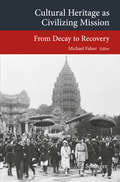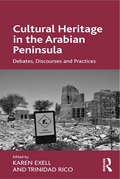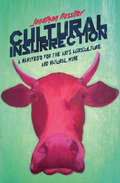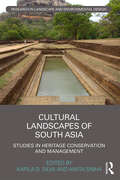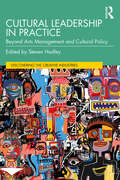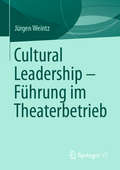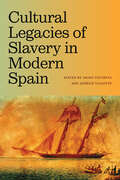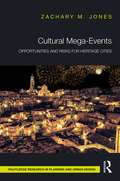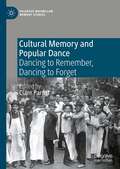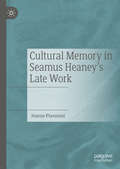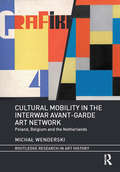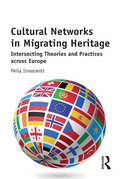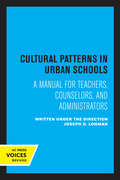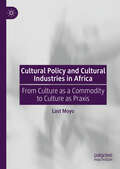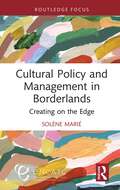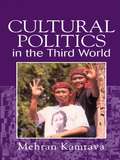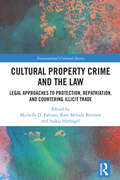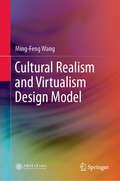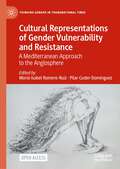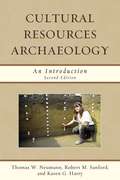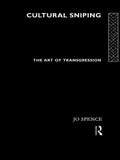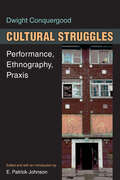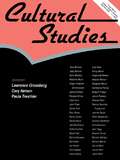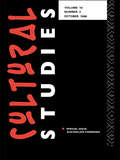- Table View
- List View
Cultural Heritage as Civilizing Mission: From Decay to Recovery (Transcultural Research – Heidelberg Studies on Asia and Europe in a Global Context)
by Michael FalserThis book investigates the role of cultural heritage as a constitutive dimension of different civilizing missions from the colonial era to the present. It includes case studies of the Habsburg Empire and German colonialism in Africa, Asian case studies of (post)colonial India and the Dutch East Indies/Indonesia, China and French Indochina, and a special discussion on 20th-century Cambodia and the temples of Angkor. The themes examined range from architectural and intellectual history to historic preservation and restoration. Taken together, they offer an overview of historical processes spanning two centuries of institutional practices, wherein the concept of cultural heritage was appropriated both by political regimes and for UNESCO World Heritage agendas.
Cultural Heritage in the Arabian Peninsula: Debates, Discourses and Practices
by Trinidad Rico Karen ExellHeritage projects in the Arabian Peninsula are developing rapidly. Museums and heritage sites are symbols of shifting national identities, and a way of placing the Arabian Peninsula states on the international map. Global, i.e. Western, heritage standards and practices have been utilised for the rapid injection of heritage expertise in museum development and site management and for international recognition. The use of Western heritage models in the Arabian Peninsula inspires two key areas for research which this book examines: the obscuring of indigenous concepts and practices of heritage and expressions of cultural identity; and the tensions between local/community concepts of heritage and identity and the new national identities being constructed through museums and heritage sites at a state level.
Cultural Insurrection: A Manifesto for Arts, Agriculture, and Natural Wine
by Jonathan NossiterFrom the director of Mondovino, a lively discussion of the expanding world of natural wine that considers the movement as a potential remedy for our current cultural crisis. What if, ten years from now, an artist--a filmmaker, for example--will have become as marginal and anachronistic as a blacksmith? What if the actors in the cultural world are on the brink of extinction, not about to disappear like prehistoric animals, but worse--submitting to the status quo? Absorbed by a marketplace that increasingly devalues true artistic work?In Cultural Insurrection, award-winning filmmaker and sommelier Jonathan Nossiter considers these questions and offers a solution inspired by the rebellious, innovative figures transforming the way we produce and consume wine. This new generation of artisans, working closely with the earth to create exceptional natural wines, has assumed the role of dissenters that artists have abandoned, and we should look to them in order to revitalize contemporary art.
Cultural Landscapes of South Asia: Studies in Heritage Conservation and Management (Routledge Research in Landscape and Environmental Design)
by Kapila D. Silva Amita SinhaWinner of the Environmental Design Research Association's 2018 Achievement Award The pluralism of South Asia belies any singular reading of its heritage. In spite of this diversity, its cultural traditions retain certain attributes that are at their core South Asian—in their capacity to self‐organize, enact and reinvent cultural memories, and in their ability to retain an intimate connection with nature and landscape. This volume focuses on the notion of cultural landscape as a medium integrating multiple forms of heritage and points to a new paradigm for conservation practices in the South Asian context. Even though the construct of cultural landscape has been accepted as a category of heritage, its potent use in heritage management in general and within the South Asian context in particular has not been widely studied. The volume challenges the prevalent views of heritage management in South Asia that are entrenched in colonial legacies and contemporary global policy frameworks.
Cultural Leadership in Practice: Beyond Arts Management and Cultural Policy (Discovering the Creative Industries)
by Steven HadleyWhat do cultural leaders really think about the problems they, and the arts and cultural sector, face? This book brings global leaders in the cultural field into dialogue with academics and experts to offer profound insight and perspectives on the complex issues the cultural sector faces in a rapidly accelerating and destabilising twenty-first century context.The book engages directly with leaders in the arts and cultural sector, bridging the gap between academia, policy and practice. Each chapter sheds new light on national cultural policy contexts, offering different perspectives on arts subsidy, audiences, the cultural workforce, heritage, artform development and how cultural leadership functions in a fast-changing local, national and international context. Interviews are conducted by academics and experts with significant knowledge and understanding of the arts management and cultural policy field, who ask critical and probing questions. Featuring interviews with an impressively international range of senior figures from the cultural sector, from the Royal Opera House, BMW, Bloomberg and Onassis Foundation and covering countries including the UK, Germany, Chile, Singapore, Greece, USA, Serbia and Ireland, the book gives a truly global overview of cultural leadership from leaders who are open to question, critique and challenge. Each chapter offers a unique and fascinating insight into the mind of a leader in their field, with their experience ranging from huge participatory events featuring tens of thousands of people to the visual arts, opera, the Turner Prize and the #blacklivesmatter movement.This book will be essential reading for reflective cultural leaders around the world, as well as a useful resource for students and scholars involved with arts and cultural management and policy.
Cultural Leadership – Führung im Theaterbetrieb
by Jürgen WeintzDie Diskurse über Führung und Leadership in der aktuellen Stadttheaterdebatte, in der Managementlehre sowie – unter dem Leitbegriff des Cultural Leadership – in der Kulturmanagementlehre werden in diesem Buch miteinander verknüpft. Das Ziel ist es, auf dieser Basis ein neues Verständnis von Führung für den Bereich der öffentlichen deutschen Theater zu gewinnen und zugleich den Begriff des Cultural Leadership am Beispiel des Theaterbetriebs konkreter zu fassen. Dabei werden alle drei Dimensionen von Führung behandelt: die Selbstführung, die Mitarbeiterführung sowie die Unternehmens- oder Organisationsführung. Und es werden alle Ebenen einbezogen, die im Theater Führungsverantwortung tragen oder an Führung mitwirken: die Kulturpolitik und die Aufsichtsgremien, Intendanz und Geschäftsführung, die mittlere Führungsebene, die Regieführung als künstlerisches Kerngeschehen sowie die ‚Führung von unten‘ durch Ensemble und Mitarbeiterschaft.
Cultural Legacies of Slavery in Modern Spain (SUNY series in Latin American and Iberian Thought and Culture)
by Akiko Tsuchiya Aurélie VialetteThis groundbreaking volume explores how culture produced in Spain, from the nineteenth century to the present, both reflects and shapes ways of understanding the history and heritage of a nation sustained by colonialism and slavery. Akiko Tsuchiya and Aurélie Vialette bring together an outstanding group of scholars, artists, cultural producers, and activists in a range of fields—from history to literary studies, anthropology to journalism, and flamenco to film. Drawing on interdisciplinary and comparative methodologies, contributors address the legacies of slavery in the archive; in cultural memory sites; and in literature, music, and visual arts. How, they ask, do different cultural forms and institutions represent and reckon with this past and push for justice in the face of persistent racial discrimination? In its focus on collective memory and the cultural afterlives of slavery and antislavery, Cultural Legacies of Slavery in Modern Spain will appeal not only to Iberian and Latin American specialists but also readers across Afro-Hispanic, postcolonial, transatlantic, and critical race studies.
Cultural Mega-Events: Opportunities and Risks for Heritage Cities
by Zachary M. JonesMega-events have long been used by cities as a strategy to secure global recognition and attract future economic investment. However, while cultural mega-events like the European Capital of Culture have become increasingly popular, cities have begun questioning the traditional model of other events such as the Olympic Games with many candidate cities cancelling bids in recent years. This approach to planning and developing cities through mega-events introduces a broad range of physical effects and nuanced institutional changes for cities, particularly for the more sensitive heritage areas of cities. This book explores these issues by first examining the dynamics of cities’ attempts to reduce overall costs and increase the sustainability of these large events by further embedding them within the existing fabric of the city and second by studying in depth the impact on the heritage of host cities. This book investigates three World Heritage Cities: Genoa, Liverpool and Istanbul, each of which have hosted the European Capital of Culture and introduced a variety of opportunities and risks for their heritage. The book highlights the potential benefits and challenges of integrating event and heritage planning to provide lessons that can help future historic cities and heritage decision makers better prepare for such events.
Cultural Memory and Popular Dance: Dancing to Remember, Dancing to Forget (Palgrave Macmillan Memory Studies)
by Clare ParfittThis book focuses on the myriad ways that people collectively remember or forget shared pasts through popular dance. In dance classes, nightclubs, family celebrations, tourist performances, on television, film, music video and the internet, cultural memories are shared and transformed by dancing bodies adapting yesterday’s steps to today’s concerns. The book gathers emerging and seasoned scholarly voices from a wide range of geographical and disciplinary perspectives to discuss cultural remembering and forgetting in diverse popular dance contexts. The contributors ask: how are Afro-diasporic memories invoked in popular dance classes? How are popular dance genealogies manipulated and reclaimed? What is at stake for the nation in the nationalizing of folk and popular dances? And how does mediated dancing transmit memory as feelings or affects? The book reveals popular dance to be vital to cultural processes of remembering and forgetting, allowing participants to pivot between alternative pasts, presents and futures.
Cultural Memory in Seamus Heaney’s Late Work
by Joanne PiavaniniCultural Memory in Seamus Heaney’s Late Work considers the ways that memory functions in Heaney’s poetry. Joanne Piavanini argues that the shaping of collective memory is one of Heaney’s major contributions as a poet. Locating Heaney in a transnational literary sphere, this book argues that his late work isdefined by a type of cosmopolitanism openness: the work moves beyond national identity to explore multiple allegiances and identifications. Moreover, Piavanini demonstrates that memory is a helpful lens to look at Heaney’s late work, in particular, because of the interplay of past, present and future in these works: in the construction of a collective memory of the Troubles; in the use of the elegy to commemorate the passing of important contemporary poets; in his writing on events with transnational significance, such as 9/11; in the slippages between past and present in poems about his family; and through the literary afterlives of texts—specifically, his appropriation of canonical classical texts. Drawing on approaches and concepts from memory studies, Piavanini considers Heaney’s late work to develop an analysis of poetry as a vehicle of memory.
Cultural Mobility in the Interwar Avant-Garde Art Network: Poland, Belgium and the Netherlands (Routledge Research in Art History)
by Michał WenderskiThis book explores the issue of cultural mobility within the interwar network of the European avant-garde, focusing on selected writers, artists, architects, magazines and groups from Poland, Belgium and Netherlands. Regardless of their apparent linguistic, cultural and geographical remoteness, their mutual exchange and relationships were both deep and broad, and of great importance for the wider development of interwar avant-garde literature, art and architecture. This analysis is based on a vast research corpus encompassing original, often previously overlooked periodicals, publications and correspondence gathered from archives around the world.
Cultural Moves: African Americans and the Politics of Representation
by Herman S. GrayHerman Gray takes a sweeping look at black popular culture over the past decade to explore culture's role in the push for black political power and social recognition. In a series of linked essays, he finds that black artists, scholars, musicians, and others have been instrumental in reconfiguring social and cultural life in the United States and he provocatively asks how black culture can now move beyond a preoccupation with inclusion and representation.
Cultural Networks in Migrating Heritage: Intersecting Theories and Practices across Europe
by Perla InnocentiThis book is a study of the role of cultural and heritage networks and how they can help institutions and their host societies manage the tensions and realise the opportunities arising from migration. In looking at past and emerging challenges of social inclusion and cultural dialogue, hybrid models of cultural identity, citizenship and national belonging, the study also sets out to answer the questions 'how'. How can cultural institutions leverage the power of cross-border networks in a contested place such as Europe today? How could they elaborate approaches and strategies based on cultural practices? How can the actions of the European Commission and relevant cultural bodies be strengthened, adapted or extended to meet these goals? Cultural Networks in Migrating Heritage will be of interest to scholars and students in museum and cultural heritage studies, visual arts, sociology of organisations and information studies. It will also be relevant to practitioners and policymakers from museums, libraries, NGOs and cultural institutions at large.
Cultural Patterns in Urban Schools: A Manual for Teachers, Counselors, and Administrators
by Joseph D. LohmanThis title is part of UC Press's Voices Revived program, which commemorates University of California Press’s mission to seek out and cultivate the brightest minds and give them voice, reach, and impact. Drawing on a backlist dating to 1893, Voices Revived makes high-quality, peer-reviewed scholarship accessible once again using print-on-demand technology. This title was originally published in 1967.
Cultural Policy and Cultural Industries in Africa: From Culture as a Commodity to Culture as Praxis
by Last MoyoThis book argues for the reconstitution of the cultural in African cultural industries and societies. It posits that African cultural industries face a deep-seated problem of the crisis of normativity that is largely rooted in the coloniality of modern cultural policy and an unconscious, but pervasive anti-Black racism culture in the continent itself. The book places hope for re-animating African agency and national cultural identities in the decolonization of cultural policy and cultural industries as consciousness industries. Only through relevant cultural policy, a higher-order cross-institutional moral and ethical value system for reconstituting the cultural in post-colonies, can Africa build truly democratic, progressive, cosmopolitan, decolonized, and self-respecting citizens and societies. Using decolonial cultural policy studies, the book develops a decolonial cultural critique that locates African culture industries within the racialized power dynamics of capitalist modernity. It explores the decolonization praxis of cultural industries and acknowledges the complexity of cultural decolonization iniatives in a continent that is so diverse, interconnected, globalized, and facing newer modes of colonialism that are aggressive and covert.
Cultural Policy and Management in Borderlands: Creating on the Edge (ENCATC Advances in Cultural Management and Policy)
by Solène MariéThis book uncovers the processes at play in the development of cultural policies, projects and networks in spaces at the edge of their countries, marked by their proximity with a borderline.On a subject which is studied mainly in North America and Western Europe and based on individual case studies, its originality lies in offering a comparative view on the subject, as well as in comparing a European case – the France-Germany borderlands – to a South American case – the Brazil-Uruguay borderlands. Through a multi-sited ethnographic study, the author develops an analysis of the formal and informal processes and networks which sustain this cultural action, looking at the relative contribution of processes led by institutions, cultural agents and the civil society.This book provides theoretical tools for the analysis of the way cultural ecosystems function in borderlands and is valuable reading for scholars of cultural policy, geography and arts management.
Cultural Politics in the Third World (Reference Library Of Social Science)
by Mehran KamravaFirst Published in 1999. Routledge is an imprint of Taylor & Francis, an informa company.
Cultural Property Crime and the Law: Legal Approaches to Protection, Repatriation, and Countering Illicit Trade (Transnational Criminal Justice)
by Saskia Hufnagel Michelle D. Fabiani Kate Melody BurmonThis book explores innovative approaches to using and operating within and around both criminal law and civil law in the detection, investigation, and restitution of illicit cultural property.The volume brings together a wide range of authors who research and work in combatting cultural property crime. It explores the normative tensions and intersections between civil and criminal law and where they complement each other in the field. It focuses on innovative legal solutions to the unique challenges presented when facing a transnational form of crime that must consider varying structures of law and order, as well as a deep understanding of the heritage in question, both in past and the present cultures. The collection examines what both areas of law contribute to preventing cultural property crime from occurring, holding offenders responsible before the law, and returning objects to their rightful owners and/or places of origin. Combining the perspectives of academics and practitioners, the volume highlights voices from around the globe, using this range of experience to explore new ideas and applications of legal theory and practice to cases involving cultural property crimes.The book will be of interest to academics and practitioners in cultural property crime in the fields of criminology, law, archaeology, museum studies, political science, economics, and law enforcement.
Cultural Realism and Virtualism Design Model
by Ming-Feng WangThe book proposes a new Cultural Realism and Virtualism design model for cultural and creative products based on Laozi’s philosophy and analysis of symbolism, metaphysics, three-layered culture, reverse-triangular cultural space and Zen aesthetics. It studies peoples that speak Austronesian languages and offers a detailed comparison of their homogeneous and heterogeneous cultures of color, clothing, housing, boats, birds, symbols, dance and ancestry, and provides insights into the cultural features of deconstruction and construction of color, style, form, shape and function, to compose cultural and creative products using complex, variable, fuzzy evaluation; and structural variation and color evaluation methods. It then uses case studies to show that the products created with the new model not only fulfilled their purpose, but also successfully entered the markets. This book helps qualify decision-making processes, improve accuracy of design scheme evaluation and enhance efficiency in product development, and as such appeals to those in the cultural and creative industry, researchers, designers and those who are interested in product design.
Cultural Representations of Gender Vulnerability and Resistance: A Mediterranean Approach to the Anglosphere (Thinking Gender in Transnational Times)
by Maria Isabel Romero-Ruiz Pilar Cuder-DomínguezThis Open Access book considers the cultural representation of gender violence, vulnerability and resistance with a focus on the transnational dimension of our contemporary visual and literary cultures in English. Contributors address concepts such as vulnerability, resilience, precarity and resistance in the Anglophone world through an analysis of memoirs, films, TV series, and crime and literary fiction across India, Ireland, Canada, Australia, the US, and the UK. Chapters explore literary and media displays of precarious conditions to examine whether these are exacerbated when intersecting with gender and ethnic identities, thus resulting in structural forms of vulnerability that generate and justify oppression, as well as forms of individual or collective resistance and/or resilience. Substantial insights are drawn from Animal Studies, Critical Race Studies, Human Rights Studies, Post-Humanism and Postcolonialism. This book will be of interest to scholars in Gender Studies, Media Studies, Sociology, Culture, Literature and History.Grant FFI2017-84555-C2-1-P (research Project “Bodies in Transit: Genders, Mobilities, Interdependencies”) funded by MCIN/AEI/ 10.13039/501100011033 and by “ERDF A way of making Europe.”
Cultural Resources Archaeology: An Introduction (Second Edition)
by Thomas W. Neumann Robert M. Sanford Karen G. HarryMost students who pursue a career in archaeology will find employment in cultural resource management (CRM), rather than in academia or traditional fieldwork. It is CRM, the protection and preservation of archaeological and other resources, that offers the jobs and provides the funding. Few textbooks, however, are dedicated to teaching students the techniques and practices of this field. Cultural Resources Archaeology, now brought completely up date in this second edition and replete with new case studies from the western U.S., fills in the gap. Drawing on their decades of teaching and field experience, the authors walk students through the intricacies of CRM. They clearly describe the processes of designing a project, conducting assessment, testing, doing essential mitigation work (Phases I, II, and III), and preparing reports. The book's emphasis on real-world problems and issues, use of extensive examples from around the country, and practical advice on everything from law to logistics make it an ideal teaching tool for archaeology students who dream of becoming practicing archaeologists.
Cultural Sniping: The Art Of Transgression
by Jo SpenceFirst published in 1995. Routledge is an imprint of Taylor & Francis, an informa company.
Cultural Struggles: Performance, Ethnography, Praxis
by E. Patrick Johnson Dwight ConquergoodThe late Dwight Conquergood's research has inspired an entire generation of scholars invested in performance as a meaningful paradigm to understand human interaction, especially between structures of power and the disenfranchised. Conquergood's research laid the groundwork for others to engage issues of ethics in ethnographic research, performance as a meaningful paradigm for ethnography, and case studies that demonstrated the dissolution of theory/practice binaries.Cultural Struggles is the first gathering of Conquergood's work in a single volume, tracing the evolution of one scholar's thinking across a career of scholarship, teaching, and activism, and also the first collection of its kind to bring together theory, method, and complete case studies. The collection begins with an illuminating introduction by E. Patrick Johnson and ends with commentary by other scholars (Micaela di Leonardo, Judith Hamera, Shannon Jackson, D. Soyini Madison, Lisa Merrill, Della Pollock, and Joseph Roach), engaging aspects of Conquergood's work and providing insight into how that work has withstood the test of time, as scholars still draw on his research to inform their current interests and methods.
Cultural Studies
by Cary Nelson Lawrence Grossberg Paula TreichlerFeaturing new essays by such prominent cultural theorists as Tony Bennett, Homi Bhabha, Donna Haraway, bell hooks, Constance Penley, Janice Radway, Andrew Ross, and Cornel West, Cultural Studies offers numerous specific cultural analyses while simultaneously defining and debating the common body of assumptions, questions, and concerns that have helped create the field.
Cultural Studies 10.3: Theorizing Politics
by Lawrence Grossberg"Cultural Studies"is an international journal committed to exploring the relationships between cultural practices and everyday life, economic relations, the material world, the State, and historical forces and contexts.
